Похожие презентации:
Principles of written communication
1. Written Communication
-Submitted byAbhishek, Alka,
Arjun, Mahak
Essentials of Written
Communication
1
2.
Essentials of WrittenCommunication
2
3.
Essentials of WrittenCommunication
3
4.
Essentials of WrittenCommunication
4
5. Opening Paragraph Of A Business Letter
• It’s an important principle of effective writing toput the most important information first.
• Your opening paragraph is the headline and is
used to state the main point of the letter
• Begin with a friendly opening; then quickly
transition into the purpose of your letter. Use a
couple of sentences to explain the purpose, but
do not go in to detail
• Try to avoid using phrases that are wordy, give
little information and create an impersonal tone.
Essentials of Written
Communication
5
6. Closing Paragraph Of A Business Letter
• Your closing paragraph should bring your letter to apolite, business-like close
• The ending of a business letter is particularly important
because it provides closing remarks that can identify
what action should be followed by the receiver
• Last paragraph should include requests, reminders and
notes on enclosures
• Also, thank the recipient for their time and attention
Eg‘I look forward to hearing from you and in the meantime,
should you have any queries, please do not hesitate to
contact me.’
Enclosed you will find...
I appreciate any feedback you may have…
Essentials of Written
Communication
6
7. PRINCIPLES OF WRITTEN COMMUNICATION
Essentials of WrittenCommunication
7
8. COMPLETENESS
Your business message is complete when itcontains all facts the receiver needs for the
reactions you desire.
1.Provide all informationwho,what,when,where and why
2.Answer all questions asked
3.If sender’s message is incomplete, use your
judgement in offering additional material.
Essentials of Written
Communication
8
9. CONCISENESS
Conciseness is saying what you have to sayin the fewest possible words.
1.Eliminate wordy expressions-use single
word in place of long phrases. Eg- ‘Now’
instead of ‘at this time’
2.Include only relevant material
3.Avoid unnecessary repetition
Essentials of Written
Communication
9
10. CONCRETENESS
It means being specific, definite and vividrather than vague and general.
Misunderstanding of words creates problems
for both parties(sender and the receiver).
1.Use specific facts and figures
2.Choose vivid,image building words.
Eg-Flood,volcano
3.Be to the point
Essentials of Written
Communication
10
11. CONSIDERATION
Consideration means preparing every message keepingthe receiver in mind.
1.Focus on ‘you’ instead of ‘I’ and ‘me’
2.Emphasize positive or pleasant facts
3.Show the benfit to the receiver
EgWe attitude- ‘I am delighted to announce that we will
extend the shopping hours.’
You attitude- ‘You will now be able to shop more with the
extended hours.’
Readers react positively when emphasis is shown to
them.
Essentials of Written
Communication
11
12. CLARITY
Message should be clear so that the receivercan understand it clearly without any ambiguity.
1.Choose precise, concrete and words which
are familiar to the sender as well as the
receiver
2.Present only one idea in each sentence
3.Use proper punctuation
4.Use short and easy to understand sentences
5.Do not use too much of technical jargon
Eg- Domicile
Home
Subsequent
After
Statement of Payment
Invoice
Essentials of Written
Communication
12
13.
Essentials of WrittenCommunication
13
14. COURTESY
Courtesy is more important and advantageousin business writing than it is in face to face
communication or conversation. Courteous
message strengthens present relations. It also
helps in creating goodwill.
1.It should respect the receiver
2.Unbiased
3.Use pleasant words like appreciate, please,
thank you
4.Message should be positive
Essentials of Written
Communication
14
15. CORRECTNESS
At the core of correctness is proper grammar,punctuation and spelling. However, a message
may be perfect grammatically and mechanically
but may still insult a customer or reduce
customer confidence in you.
1.Make use of appropriate and correct
language in the message
2.Verify correctness of facts and figures
3.Use proper punctuation
4.Ensure the message is well timed
Essentials of Written
Communication
15
16. SOME DO’S AND DON’T’S IN CORRESPONDENCE
Essentials of WrittenCommunication
16
17. DO’S
• Letterhead must be attractive and must givethe full name, full address and other details
accurately
• When a number of addresses are given,
make it clear where the correspondent is
supposed to reply to you
• Ensure there are no spelling mistakes
• Letter should be to the point ,precise and
clear
• Check enclosures
• Be courteous
Essentials of Written
Communication
17
18. DONT’S
• Do not delay a reply but also do not be inhurry
• Do not be confused or long winded
• Don’t be rude. Be polite
• Do not make a personal attack
• Do not miss relevant points when replying to
letters
• Do not write to the wrong authority
• Do not use technical jargon unless the
situation demands
Essentials of Written
Communication
18
19. Mechanics of Letter Writing
Planning Written MessageIdentify the purpose and type
Develop clear perceptions of the audience
Context of the message
Apply techniques for adapting messages to the
audience
Organizing and outlining of message
Prepare the first draft
Essentials of Written
Communication
19
20. 7 Essential Letter-Writing Techniques
7 Essential Letter-Writing Techniques1)
2)
3)
4)
5)
6)
7)
Keep It Short And To The Point
Make It Clear, Concise, And Logical
Focus On The Recipient’s Needs
Use Simple And Appropriate Language
Use Short Sentences And Paragraphs
Review And Revise It
Double Check Spelling And Grammar
Essentials of Written
Communication
20
21. Routine Letters
Good-News Message
Thank You Message
Appreciation Message
Routine Claims
Routine Requests
Routine Messages About Orders and Credit
Essentials of Written
Communication
21
22. Steps to be followed
• Identify the principal idea(pleasant orroutine idea)
• Present sufficient supporting detail in
logical sequence
• Ensure accuracy of facts or figures
• Structure the message to meet legal
requirements and ethical dimensions
Essentials of Written
Communication
22
23. Organization:
• Place the major idea in first sentence.• Present supporting details in logical sequence.
• Include final idea that is courteous and indicates
a counting relationship with the receiver; may
include sales promotional material.
Essentials of Written
Communication
23
24.
August 02, 1990Mr. Robin Williams,
Personal Assistant,
BRED & Co.,
Derry, UK
Dear Mr. Williams,
We at DMC are pleased to hear that Mrs. Kate West, President of
BRED & Co., is visiting our company. We warmly welcome her visit
and assure proper hospitality.
I am writing to you to enquire about her routine and her flight details.
The routine if sent to us will facilitate our representative to receive
her at the airport and arrange for her stay. Also her schedule will
help us arrange for her to see our company. Also if she can tell us
when she would like to have the meeting scheduled, it would be
convenient for us to arrange for it. I request you to consult her and
send her routine as soon as possible to me.
We are eagerly looking forward to her visit.
Warm Regards,
Christopher Jones,
Hospitality Head
Essentials of Written
Communication
24
25. Word Flash!
DeadlineMeeting
Downsize
Essentials of Written
Communication
25
26. Bad News Letters
1) Minimizing damage to the relationship2) Showing that the decision is fair and
reasonable
3) Stating the bad news clearly and firmly
Essentials of Written
Communication
26
27. Basic Steps to Make the Best of a Bad Situation
1) Begin with a positive or at least a neutralopening
"Your company has offered a quality product to
the athletic community for the past 25 years."
Essentials of Written
Communication
27
28. Continued…
2) Provide background details about the nature ofthe bad news
"We arrived at your restaurant about 1 p.m. The
hostess seated us promptly, but we then waited
approximately 20 minutes for the server to arrive
at our table………When we asked Helen to have
our steaks re-cooked, she angrily grabbed our
plates. After 20 minutes of additional waiting, we
finally left, paying the cashier for our beverages."
Essentials of Written
Communication
28
29. Continued…
3)In the third paragraph, state exactly what youwant the manager to do with your bad news.
"I just wanted to bring this situation to your
attention so you can train servers to be more
careful with customers' cooking preferences."
Essentials of Written
Communication
29
30. Continued…
4)In the final paragraph, close on an upbeat notewith a positive look to the future, suggesting
confidence in the ability to restore good
relations:
"I am sure this episode can be quickly
addressed to ensure that future visits will be
comfortable and enjoyable."
Essentials of Written
Communication
30
31. CheeseBurger Approach
Essentials of WrittenCommunication
31
32. Few points to remember
• Avoid negative words like "can't," "bad,""unfortunate," "regret," "mistake," "terrible," and
the like.
• Most organizations appreciate heart-felt
feedback even when it is bad news.
• Leave the door open for a future relationship.
Essentials of Written
Communication
32
33. Persuasive Letters
To convince others to think a certain way and/or take anaction.
Written daily to a variety of audiences
Essentials of Written
Communication
33
34. How about this!!
Dear Bo$$In thi$ life, we all need $ome thing mo$t de$perately. I
think you $hould be under$tanding of the need$ of u$
worker$ who have given $o much $upport including
$weat and $ervice to your company.
I am $ure you will gue$$ what I mean and re$pond $oon.
Your$ $incerely,
Norman
Essentials of Written
Communication
34
35. $o who is $marter!!
Dear NOrman,I kNOw you have been working very hard. NOwadays, NOthing
much has changed. You must have NOticed that our company
is NOt doing NOticeably well as yet.
NOw the newspaper are saying the world`s leading
ecoNOmists are NOt sure if the United States may go into
aNOther recession. After the NOvember presidential elections
things may turn bad.
I have NOthing more to add NOw. You kNOw what I mean.
Yours truly,
Manager
Essentials of Written
Communication
35
36. Persuasive Requests
Content:Convince Receiver
Point out way(s) in which receiver will benefit
Incorporate primary appeal
Identify specific action required
Essentials of Written
Communication
36
37. Organization:
• Use inductive sequence of ideas• First sentence must draw attention and reveals
the subject of message
• Introduce appeal in 1st two or three lines and
reinforce it throughout rest of message
• Point out receiver benefits
• Associate desired action with receivers award
for taking action
• Final paragraph
Essentials of Written
Communication
37
38.
Tips:• Do not make your letter more than one typed page.
• Do some research before you come up with reasons
supporting your arguments.
• Do not fill your letter with numbers and poll results.
• Try to include quotes in your letter.
• When stating the arguments against, try to come up with
a solution to them; or find information that proves those
arguments wrong.
Essentials of Written
Communication
38
39.
Warnings:• Do not threaten anyone in your letter or yell at the
person you are presenting your letter to.
• Don't swear or use vulgar language in your letter.
• Do not lecture or be overly redundant.
• Do not be over confident or sound arrogant.
• Try to make the person you are sending the letter to be
on your side
Essentials of Written
Communication
39
40.
To,Mr Smith,
ABD Corp,
Respected Mr. Smith,
Subject: An Offer too Good to Refuse!!!
Before you roll your eyes thinking, 'Oh God! Not another one!', and chuck
this into a bin, just read a few of the lines below.
Imagine the mellow sun and the grainy sand. Imagine the soft rolling of the
waves of the sea. …….. Imagine a place where you can sleep when you
want, wake up when you want, do what you want, and live the way YOU
want.
Sounds great doesn't it?
Welcome to Really Amazing resorts. At RA resorts, we promise to deliver
the best service, the best food, the BEST of everything for just for you.
……….
And on account of our first anniversary, we're giving you a 65% discount on
rooms and 40% discount from normal price on food and beverages! So
hurry.
Call 1-800-Really Amazing to know more.
Thanking You,
Myname Lettersender.
Essentials of Written
Communication
40
41. A quick check to your written communication!!
You are a team leader and you need toget a report submission by the end of day
from an employee who is already
overloaded with the work.
How will you write to him??
Essentials of Written
Communication
41
42.
Hi Anil,How are you doing?
I would like to acknowledge the fact that you are a
valuable asset for the organization . The way you are
putting efforts for this project is truly commendable and
has been well received by client and management.
I know you are already having many tasks to work on but
it would be highly appreciated if you can complete the
attached report and submit it by the end of day.
Keep up the good work!
Thanks & Regards,
Alka
Essentials of Written
Communication
42
43. Application letter
Written when someone needs a job• Since the application seeks to sell his
services,
• kind of sales letter
• Objective to obtain an interview
Essentials of Written
Communication
43
44.
These are of two types• SOLICITED-written in response to an
advertisement
• UNSOLICITED-written at the writer’s initiative
• written on the principles of the ‘you’ attitude
• You attitude means “what I have got that an
employer can use profitably?”
Enclosure• Good policy to mention the number or nature of
documents enclosed with.
Essentials of Written
Communication
44
45. Format of application letter
Dear sirwith respect to your advertisement in abc
website , I think my credentials meet all
your requirements.
so I am keenly interested to give an
interview for that job. looking forward for a
positive response from your side.
Yours sincerely
xyz
Essentials of Written
Communication
45
46. Interview letter
Details to be included:Time, date and place of the interview
Name of authority before whom candidate
has to appear
Request to produce his/her certificates
Candidate should be informed whether
he/she is entitled to any T.A or D.A
Essentials of Written
Communication
46
47. Letters of appointment
• Convey the appointment with words ofcongratulations.
• Request the appointee to convey his acceptance.
• Date and time is mentioned when to report for the duty.
• If it is an imp. Vacancy being filled in, tell the appointee
what work is expected of him
• Mention whether the appointment is permanent or
temporary.
• Salary , allowances and other benefits
Essentials of Written
Communication
47
48. Collection letter
• These letters are periodical statements ofaccounts
• Has to deal with a problem of collecting the dues
and retain the customers as well
• No standard approach is applied while writing
letter
Essentials of Written
Communication
48
49. Guidelines to be followed
• Tone should be positive• The ‘you’ attitude should be used to convince
the debtor
• Friendly approach should be used
• Before forcing the debtor to pay An appeal
should be made to his fairness, self respect
• Humorous collection letters should be used
Essentials of Written
Communication
49
50. Examples of humorous collection letters
Dear sirRoses are red,
Violets are blue,
Send us a cheque
And we’ll love you
*unless your cheque is already en route, we’ll
expect one by return mail. Our records show that
your balance of RS……… remains unpaid.
Yours sincerely
Essentials of Written
Communication
50
51.
Dear sirHow do you do?
Some pay when due,
Some pay when overdue,
Some never do,
How do you do?
Your bill for Rs………is long overdue.
Essentials of Written
Communication
51
52. Circular letters
Communicating a message to a largenumber of customers and suppliers
circulate the same message
Attractive style and appropriate tone proves quite
effective
Use of the ‘you’ attitude , catchy words and
sentences and different colours are some
ingredients of an effective circular letter
Essentials of Written
Communication
52
53. Objectives
• To obtain publicity for a cause, a campaign• To make the reader interested in their contents
• To impress the reader with facts and information
about the firm
• To gain the confidence of the reader
Essentials of Written
Communication
53
54. Situation that need circular letter
Opening of a new shop
Change in address of the firm
Introduction of a new product
Price reduction and clearance sales
Obtaining an agency
Merger with a new firm
Essentials of Written
Communication
54
55. Sales letters
• Publicity has a major role to play in competitivesociety. publicity and advertisement are an
impersonal form of salesmanship
• No business can be done successfully without
publicity
• Sales letter is a part of publicity and
advertisement.
Essentials of Written
Communication
55
56. Advantages of sales letter
• Easy to avoid salesman but not sales• Quite cheap
• It can quietly wait till the addressee has enough
leisure to go through it
• Addressed to a particular class of customers,
age group , professional group
• Sales letter gets direct and free entry even into
the ‘NO ADMISSION WITHOUT PERMISSION’
room
Essentials of Written
Communication
56
57. Functions of the sales letter
• Attracting attention• Arousing interest
• Educating and
convincing
• Stimulate desire
• Securing action
Save 50%on Your Electricity Bill
Essentials of Written
Communication
57
58. Communicating Electronically
• Identify the appropriate use of communicationtechnology, including its legal and ethical
implications.
• Identify the effective use of email and instant
messaging in business communication.
• Understanding the principles for writing effectively
for the WEB.
Essentials of Written
Communication
58
59.
"Netiquette" stands for "Internet Etiquette", and refers to the set ofpractices created over the years to make the Internet experience pleasant
for everyone.
Essentials of Written
Communication
59
60. Emails
Turnaround time very fast.Different from conventional
compositions and your speech.
Essentials of Written
Communication
60
61. Email
• It facilitates the fast,convenient flow ofinformation among users at various
locations and time zones.
• It reduces costs .
• It increases efficiency .
• Go Green:Reduces paper waste.
Essentials of Written
Communication
61
62. Email Etiquette
Professionalism: by using proper email language your company will convey aprofessional image.
.
Efficiency: emails that get to the point are much more effective than poorly worded
emails.
Protection from liability: employee awareness of email risks will protect your
company from costly law suits.
Essentials of Written
Communication
62
63. Context
• Useful Subject LinesTerse,crisp and lucid.
Ex:
Subject: Need Dabur report by Tuesday
Dave – I need Dabur’s report for
Tuesday’s class in Chandigarh.
Essentials of Written
Communication
63
64.
Essentials of WrittenCommunication
64
65.
• For time critical messages starting with URGENT: is a good idea.
Subject : URGENT: need Dabur Report.
• For requests starting with REQ:can signal action
is needed.
Subject: REQ:Report needed by EOD.
• Non-urgent information that requires no response
from the other person use FYI(For your
information).
Subject:FYI: Chocolates @ BDC.04A.216
Essentials of Written
Communication
65
66.
• Answer all questions, and pre-emptfurther questions.
Imagine for instance that a customer sends you an email asking which credit
cards you accept. Instead of just listing the credit card types, you can guess that
their next question will be about how they can order, so you also include some
order information and a URL to your order page. Customers will definitely
appreciate this.
Essentials of Written
Communication
66
67. The Don’ts
• Never use subject line as:Subject : Information
Please send me information all the
information regarding Business
Communication.
Subject : BC syllabus and important
topics wrt to exams
Essentials of Written
Communication
67
68.
• Do not attach unnecessary files.• Do not write in CAPITALS.
• Don't forward virus hoaxes and chain
letters
• Don't reply to spam.
• Do not overuse the high priority option
Essentials of Written
Communication
68
69.
• Take care with abbreviations and emoticons.Careful use of jargons and technical words.
Info,rep,stat
BTW,LOL,ROFL,BRB
Essentials of Written
Communication
69
70. Effective System for Handling Email
• Set up separate accounts for receivingmessages that require direct attention.
• Keep your mailbox clean.
• Setup folders to organize messages for
quick retrieval.
Essentials of Written
Communication
70
71.
Check mail promptly.
Do not contribute to email overload.
Use email selectively.
Do not send messages when you are
angry.
“Send a FLAME”
• Exercise caution against email viruses
and hoaxes.
Essentials of Written
Communication
71
72. Instant Messaging(IM)
• Never directly jump to other’s end.• Remember to keep it short and simple.
• Use it for quick decision.
Essentials of Written
Communication
72
73.
Essentials of WrittenCommunication
73
74. Resume
One Size Resume/CV Doesn't Fit All
Know Your Potential Employer
Clearly Identify Your Skills
Be Concise
Look Sharp
CV Contents is More Important than Resume
Formats
• Be Specific
• Don't Rush, Take Your Time
Essentials of Written
Communication
74
75. FunnY B0Ne!!
To acquire a creative development position within the
entertainment industry that would utilize my vast (2 years)
technical experience!!
My goal is to be a meteorologist. But since I have no training in
meteorology, I suppose I should try stock brokerage!!
I demand a salary commiserate with my extensive experience!!
Essentials of Written
Communication
75
76. What should resume have?
Career Objective
Career Summary
Education
Related Experience
Languages
Volunteer Work
Skills
Honors and activities.
Essentials of Written
Communication
76
77.
Essentials of WrittenCommunication
77
78. Memos
• A memo is a document typically used forcommunication within a company.
• Memos can be as formal as a business
letter and used to present a report.
• Generally memos are sent to co-workers
and colleagues, you do not have to
include a formal salutation or closing
remark.
Essentials of Written
Communication
78
79. Purpose of a Memo
• Usually you write memos to informreaders of specific information.
• You might also write a memo to persuade
others to take action, give feedback on an
issue, or react to a situation.
• However, most memos communicate
basic information, such as meeting times
or due dates.
Essentials of Written
Communication
79
80. Audience Analysis
• The typical audience for a memo is yourco-workers and colleagues.
• It is helpful, however, to inform readers
about the context.
• Inform why the meeting is occurring in the
first place.
Essentials of Written
Communication
80
81. Format of a Memo
Memo has a "to," "from," "subject," and
"date" entry.
Heading
Message
Tone
Length
Format Guidelines
Essentials of Written
Communication
81
82. Kinds of Memo
Directive Memo• “The purpose of this memo is to let all
members of the ABC department know
that doughnuts will be provided every
Friday morning at 8 a.m.“
Essentials of Written
Communication
82
83. Response Memo
• The purpose of this memo is to providethe audience with desired information. It
usually has four parts:
– purpose statement
– summary
– discussion
– action
Essentials of Written
Communication
83
84. Trip Report Memo
• A trip report memo is usually sent to asupervisor after an employee returns from
a business venture. The structure is listed
below:
– purpose statement
– summary
– discussion
– action
Essentials of Written
Communication
84
85. Minutes of Meeting MOM
Minutes are the official record of an organization. It is crucialthat they are accurate since they are the legal record of the
proceedings and actions of the organization .
Essentials of Written
Communication
85
86. Content
Kind of meeting (regular, special, etc.).
Name of the organization.
Date, time and place of the meeting.
Approximate number of members present.
Establishment of a quorum and recording
of the action taken on the minutes of the
previous meeting.
Essentials of Written
Communication
86
87. Case Study Meeting Invite
• As a offshore team member you are facingsome difficulties in the requirement
document received from client.
Prepare a meeting invite stating your
concern and to have a meeting(on-call )
with him.
Essentials of Written
Communication
87
88. Responses recorded
To:Optional:
Subject:
Agenda
Availability
Meeting ID(if required)
Contact number
Essentials of Written
Communication
88
89.
ToBackground Building.
Date/Time availablity.
Suggestions.
Essentials of Written
Communication
89
90.
ToCC
Time and Date
Agenda
Impact on Business
Timeline
Accept or Decline the Meeting Invite
Essentials of Written
Communication
90
91.
Thank You!!Question??
Essentials of Written
Communication
91




















































































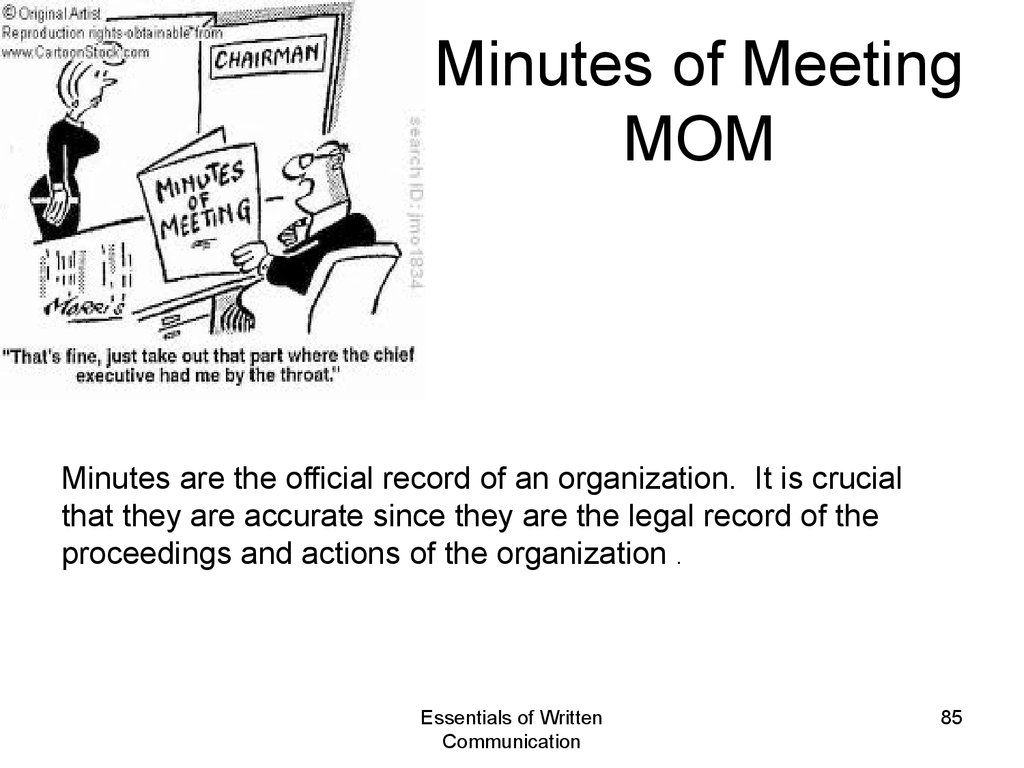

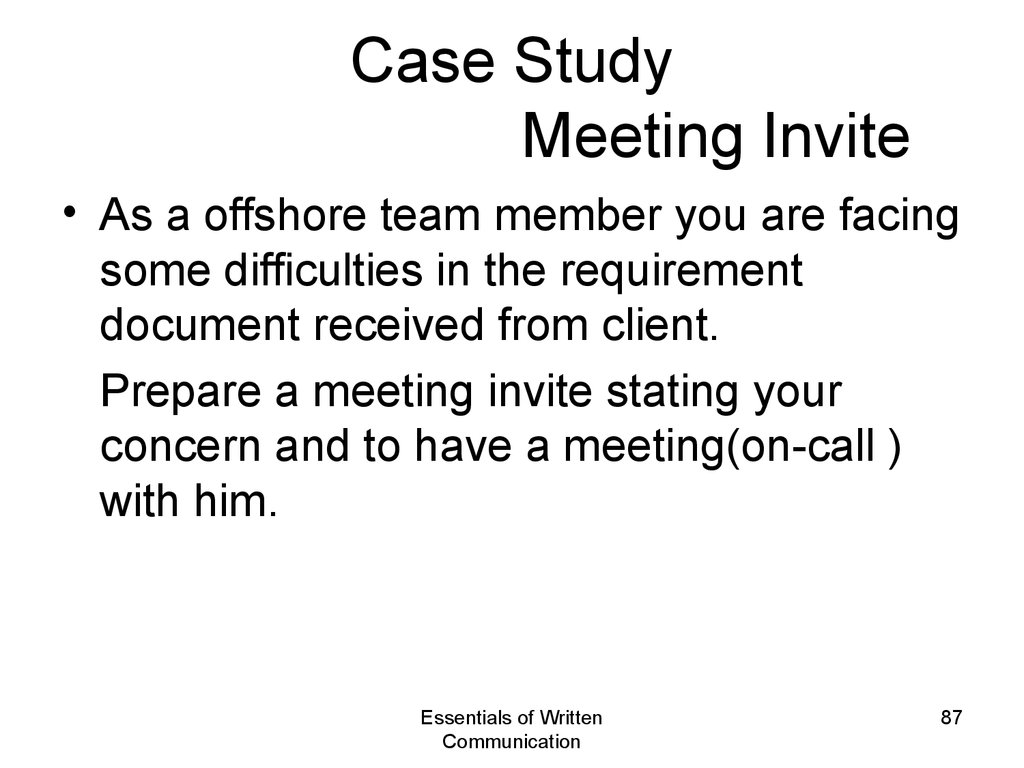

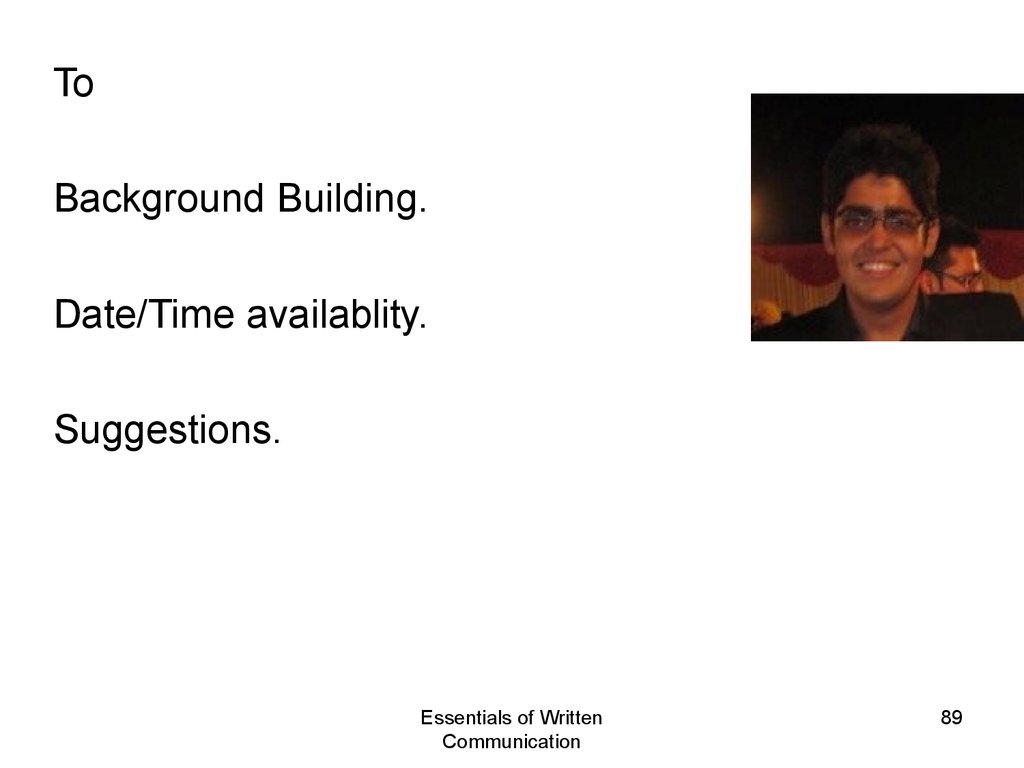
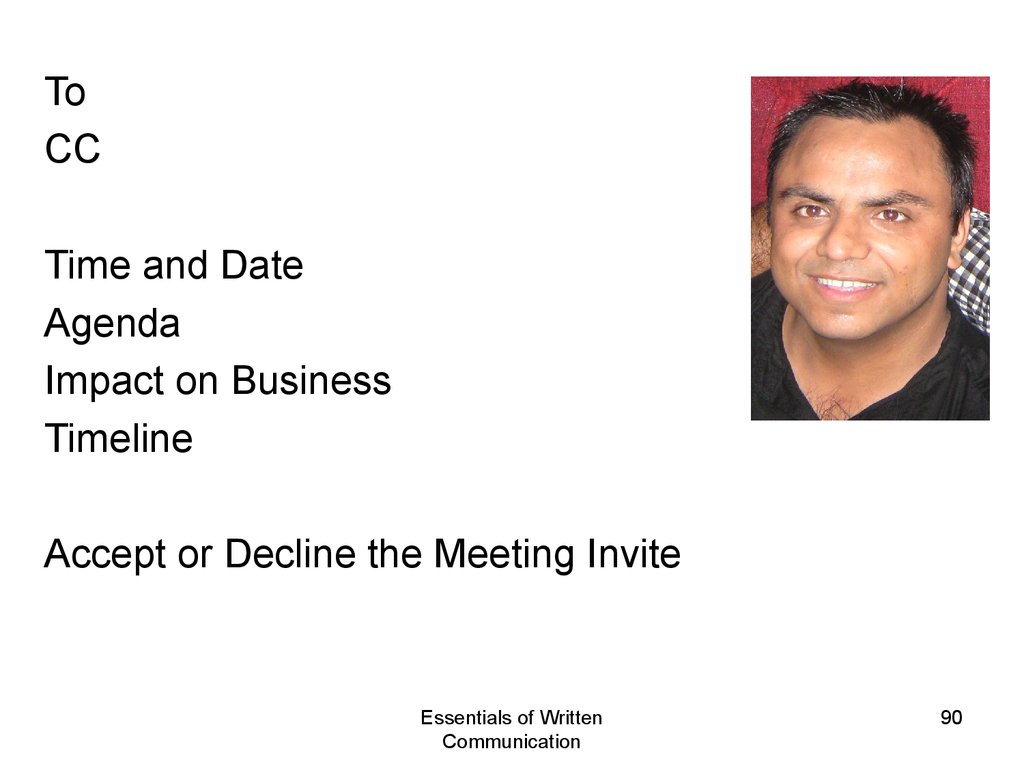
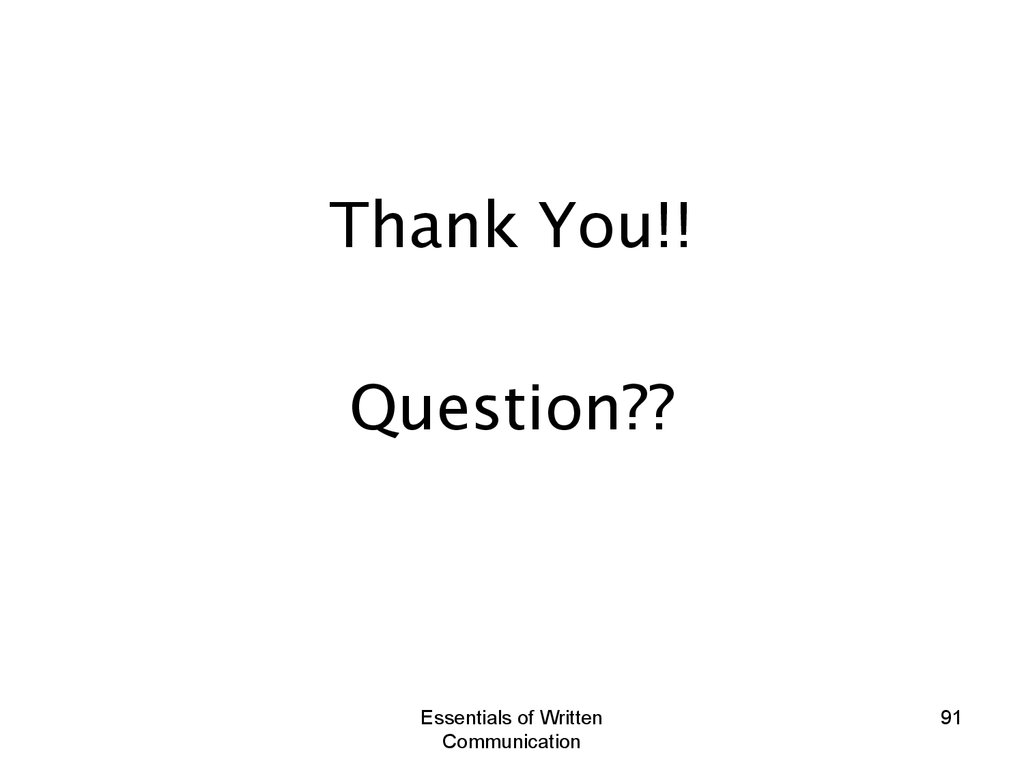
 Бизнес
Бизнес








